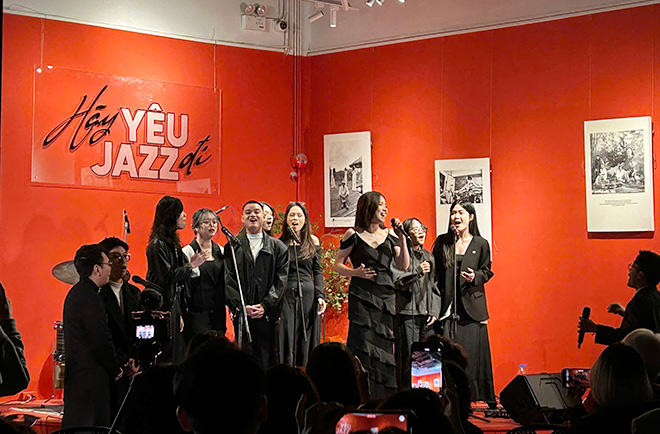At the beginning of the press conference, the song "I dare you to sleep" brought the audience deep feelings through jazz-style arrangement. Each love song of Trinh Cong Son brings listeners back to old memories.
"Let's Love jazz Go" is a project to renew and spread Trinh Cong Son's songs in jazz, fusion and acoustic styles. In particular, besides Vietnamese songs, there are also songs translated into English, Japanese and Korean.
The crew emphasized: Whether singing in Vietnamese, English or any language, that melody still tells the same story about love, loneliness, loss and the desire to live a decent life. We believe that Trinh Cong Son's music can "live" in many languages, like different winds blowing through the same soul. Every translation, every voice is a new dialogue with beauty and sadness - a dialogue that never ends.
Quynh Pham is one of the singers who has been associated with jazz for the past 25 years, and is also the founder of this project. Quynh Pham said that the project's name was inspired by the song "Let's love each other" by musician Trinh Cong Son.
The project's artistic consultant is Music Director, piano artist Vu Quang Trung and Lecturer of the Jazz Department of the Vietnam Academy of Music Quyen Thien Dac.
Singer Trinh Vinh Trinh - the younger sister of musician Trinh Cong Son - has sent sincere advice to young singers participating in the Trinh music project in English. She said that many young people asked how to perform the song in the true spirit of Trinh Cong Son. She gently replied: "Let's sing with the feelings of our hearts".
According to her, Trinh Cong Son's music is inherently profound and full of meaning, even when performed in Vietnamese, it is not easy to fully understand. Therefore, the important thing is not the language, but the true affection and vibration of the singer - only then can Trinh's music truly touch the hearts of listeners.

This is not the first time Trinh's music has been translated. Trinh's music has been translated into many different languages, with outstanding bilingual projects between Vietnam - England and Vietnam - France such as the book "I - ai don't despair" (English), the album "Dong Lan hat Trinh Cong Son - Noi em co nho" (French) and the project "Vie-En Trinh" (Voi Trinh music - English).
In the project "Let's love jazz go", the translation from Vietnamese to English was undertaken by 2 English/fake language consultants.
Sharing with reporters, Mr. Nguyen Nhat Tuan - lecturer of the Postgraduate Training Department of Hanoi University - who plays the role of interpreter in the project, said about the difficulties in translating: "In my opinion, the biggest challenge lies in the difference between the two languages: Vietnamese is the monophone language, while English is multi-toned, making it difficult to match the lyrics with the melody. I had to choose short words, suitable for open and closed amages so that the singer could sing naturally.
The second difficulty was to convey the image and poetry in the poem from Trinh Cong Son. Because each article has many layers of meaning and metaphorical images, the translator needs to select typical details to still retain the spirit, emotional flow and logic of English.
The third is to keep the " spirit of Trinh Cong Son" - the philosophy of love, freedom, and abandonment. Translating is not only a translation but also a suitable "choose a meaning layer", blending with the melody and emotions of the song".
Quynh Pham also said that the difference between the two languages of Vietnamese and English is also reflected in the way of preparation and expression.
Vietnamese songs often have short breaths, almost whispering, while English versions have to expand, add or reduce the emphasis to make the melody natural.
When singing in Vietnamese, singers can sing along to the melody, while singing in English must follow the scale and shape. Therefore, with the same melody, the Vietnamese version is a memory in the mist, while the English version is a clear tu nhien sentence with a more Western breathing, Quynh Pham shared.











